BIZ301 Venture Plan: Phone-Free Cafe - Innovation and Strategy
VerifiedAdded on 2023/06/10
|7
|1456
|355
Report
AI Summary
This report explores the innovative concept of phone-free dining in café shops, analyzing potential market gaps and opportunities. It highlights the value proposition of this service, emphasizing benefits like eliminating cyberbullying, strengthening relationships, increasing language skills, reducing social media addiction, and improving the quality of interactions. The report concludes that this innovation has the potential to benefit the entire society and is worth implementing in all café shops due to its positive impact on interrelationships and overall well-being. Desklib offers similar solved assignments and resources for students.
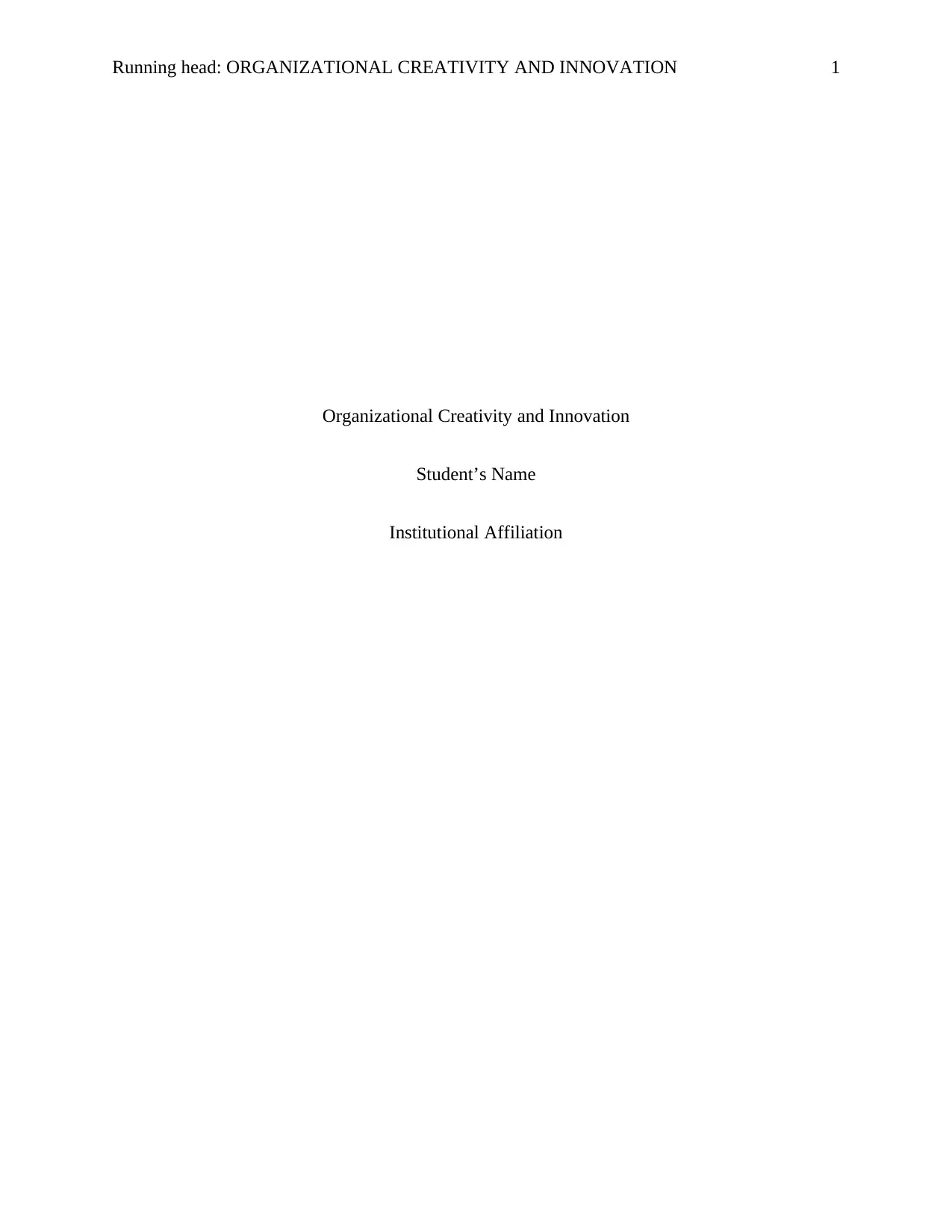
Running head: ORGANIZATIONAL CREATIVITY AND INNOVATION 1
Organizational Creativity and Innovation
Student’s Name
Institutional Affiliation
Organizational Creativity and Innovation
Student’s Name
Institutional Affiliation
Paraphrase This Document
Need a fresh take? Get an instant paraphrase of this document with our AI Paraphraser
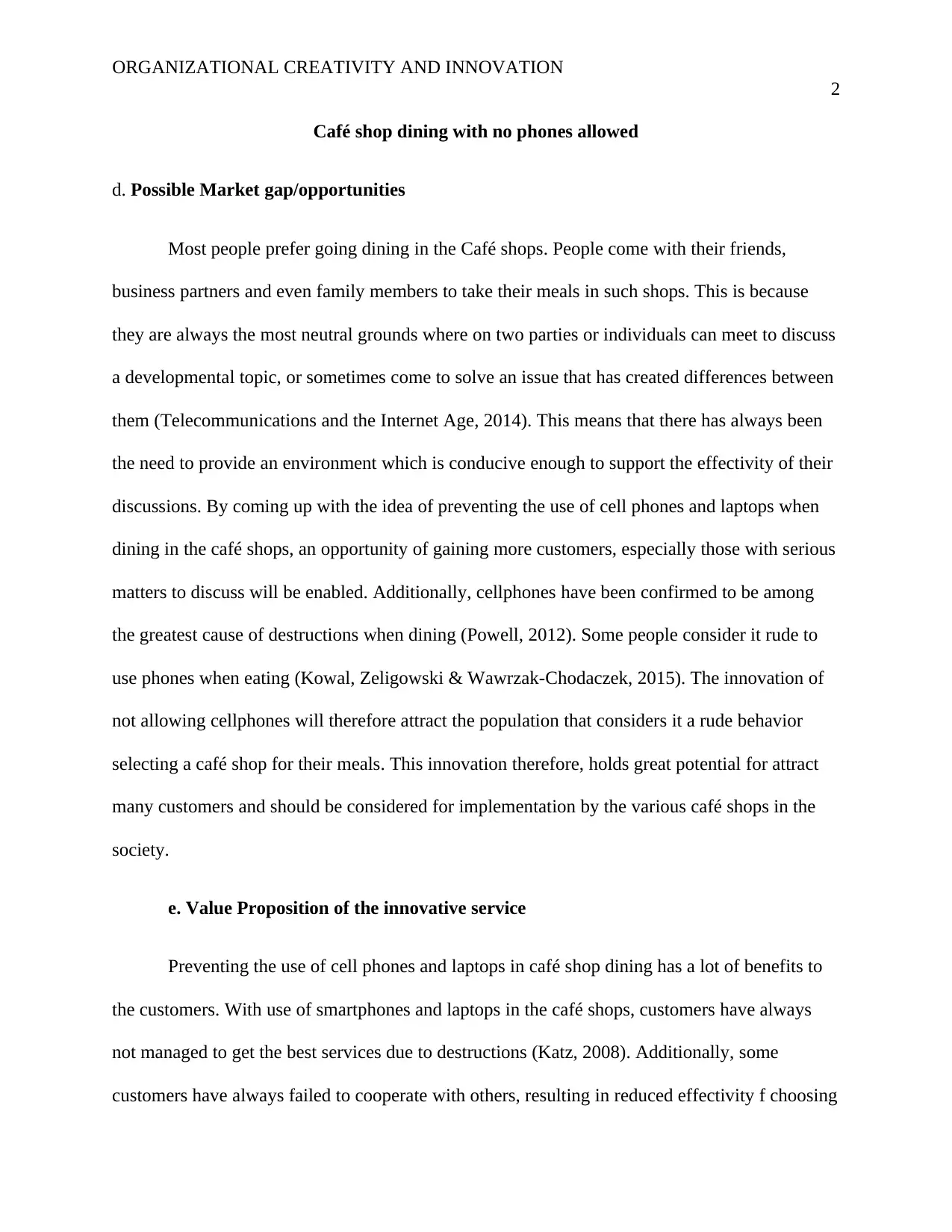
ORGANIZATIONAL CREATIVITY AND INNOVATION
2
Café shop dining with no phones allowed
d. Possible Market gap/opportunities
Most people prefer going dining in the Café shops. People come with their friends,
business partners and even family members to take their meals in such shops. This is because
they are always the most neutral grounds where on two parties or individuals can meet to discuss
a developmental topic, or sometimes come to solve an issue that has created differences between
them (Telecommunications and the Internet Age, 2014). This means that there has always been
the need to provide an environment which is conducive enough to support the effectivity of their
discussions. By coming up with the idea of preventing the use of cell phones and laptops when
dining in the café shops, an opportunity of gaining more customers, especially those with serious
matters to discuss will be enabled. Additionally, cellphones have been confirmed to be among
the greatest cause of destructions when dining (Powell, 2012). Some people consider it rude to
use phones when eating (Kowal, Zeligowski & Wawrzak-Chodaczek, 2015). The innovation of
not allowing cellphones will therefore attract the population that considers it a rude behavior
selecting a café shop for their meals. This innovation therefore, holds great potential for attract
many customers and should be considered for implementation by the various café shops in the
society.
e. Value Proposition of the innovative service
Preventing the use of cell phones and laptops in café shop dining has a lot of benefits to
the customers. With use of smartphones and laptops in the café shops, customers have always
not managed to get the best services due to destructions (Katz, 2008). Additionally, some
customers have always failed to cooperate with others, resulting in reduced effectivity f choosing
2
Café shop dining with no phones allowed
d. Possible Market gap/opportunities
Most people prefer going dining in the Café shops. People come with their friends,
business partners and even family members to take their meals in such shops. This is because
they are always the most neutral grounds where on two parties or individuals can meet to discuss
a developmental topic, or sometimes come to solve an issue that has created differences between
them (Telecommunications and the Internet Age, 2014). This means that there has always been
the need to provide an environment which is conducive enough to support the effectivity of their
discussions. By coming up with the idea of preventing the use of cell phones and laptops when
dining in the café shops, an opportunity of gaining more customers, especially those with serious
matters to discuss will be enabled. Additionally, cellphones have been confirmed to be among
the greatest cause of destructions when dining (Powell, 2012). Some people consider it rude to
use phones when eating (Kowal, Zeligowski & Wawrzak-Chodaczek, 2015). The innovation of
not allowing cellphones will therefore attract the population that considers it a rude behavior
selecting a café shop for their meals. This innovation therefore, holds great potential for attract
many customers and should be considered for implementation by the various café shops in the
society.
e. Value Proposition of the innovative service
Preventing the use of cell phones and laptops in café shop dining has a lot of benefits to
the customers. With use of smartphones and laptops in the café shops, customers have always
not managed to get the best services due to destructions (Katz, 2008). Additionally, some
customers have always failed to cooperate with others, resulting in reduced effectivity f choosing
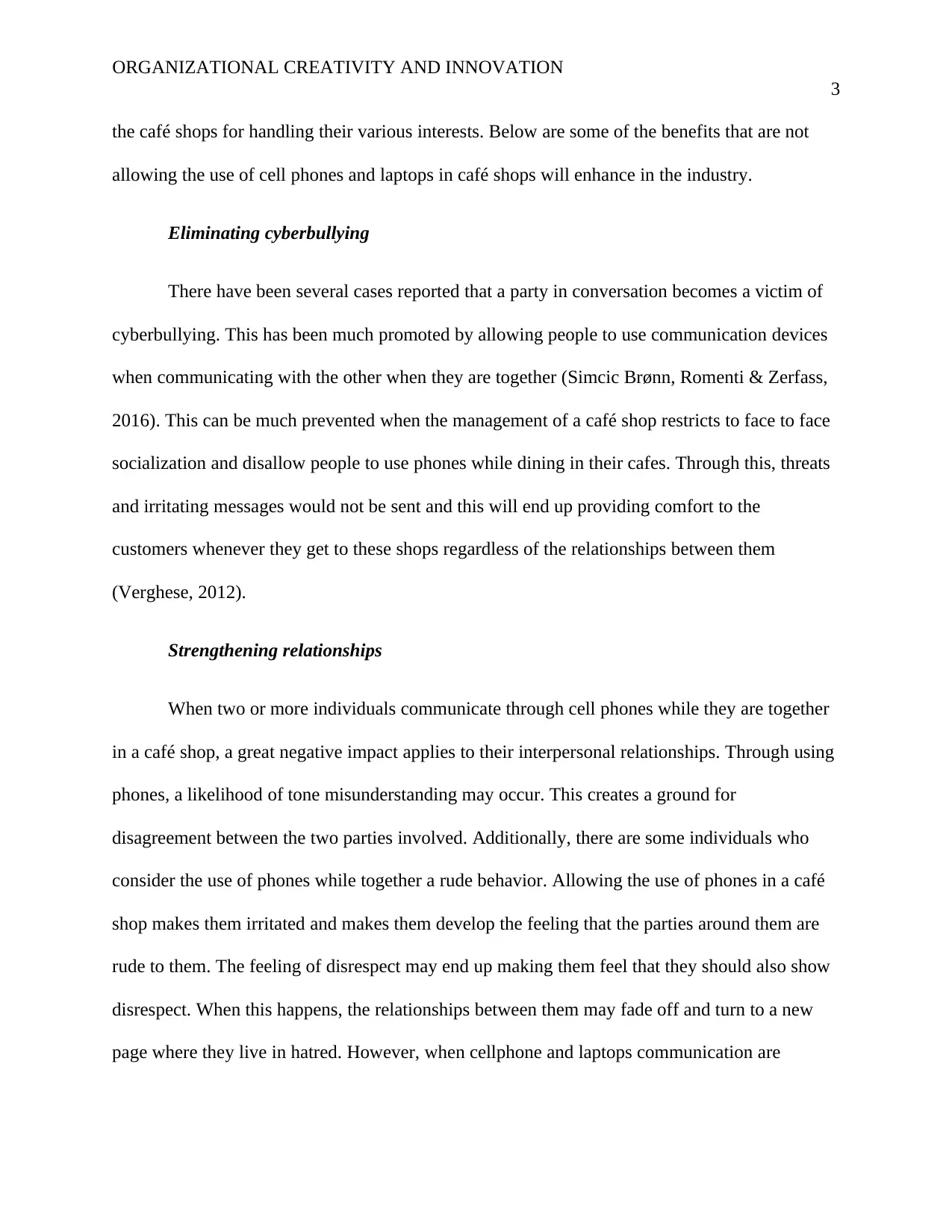
ORGANIZATIONAL CREATIVITY AND INNOVATION
3
the café shops for handling their various interests. Below are some of the benefits that are not
allowing the use of cell phones and laptops in café shops will enhance in the industry.
Eliminating cyberbullying
There have been several cases reported that a party in conversation becomes a victim of
cyberbullying. This has been much promoted by allowing people to use communication devices
when communicating with the other when they are together (Simcic Brønn, Romenti & Zerfass,
2016). This can be much prevented when the management of a café shop restricts to face to face
socialization and disallow people to use phones while dining in their cafes. Through this, threats
and irritating messages would not be sent and this will end up providing comfort to the
customers whenever they get to these shops regardless of the relationships between them
(Verghese, 2012).
Strengthening relationships
When two or more individuals communicate through cell phones while they are together
in a café shop, a great negative impact applies to their interpersonal relationships. Through using
phones, a likelihood of tone misunderstanding may occur. This creates a ground for
disagreement between the two parties involved. Additionally, there are some individuals who
consider the use of phones while together a rude behavior. Allowing the use of phones in a café
shop makes them irritated and makes them develop the feeling that the parties around them are
rude to them. The feeling of disrespect may end up making them feel that they should also show
disrespect. When this happens, the relationships between them may fade off and turn to a new
page where they live in hatred. However, when cellphone and laptops communication are
3
the café shops for handling their various interests. Below are some of the benefits that are not
allowing the use of cell phones and laptops in café shops will enhance in the industry.
Eliminating cyberbullying
There have been several cases reported that a party in conversation becomes a victim of
cyberbullying. This has been much promoted by allowing people to use communication devices
when communicating with the other when they are together (Simcic Brønn, Romenti & Zerfass,
2016). This can be much prevented when the management of a café shop restricts to face to face
socialization and disallow people to use phones while dining in their cafes. Through this, threats
and irritating messages would not be sent and this will end up providing comfort to the
customers whenever they get to these shops regardless of the relationships between them
(Verghese, 2012).
Strengthening relationships
When two or more individuals communicate through cell phones while they are together
in a café shop, a great negative impact applies to their interpersonal relationships. Through using
phones, a likelihood of tone misunderstanding may occur. This creates a ground for
disagreement between the two parties involved. Additionally, there are some individuals who
consider the use of phones while together a rude behavior. Allowing the use of phones in a café
shop makes them irritated and makes them develop the feeling that the parties around them are
rude to them. The feeling of disrespect may end up making them feel that they should also show
disrespect. When this happens, the relationships between them may fade off and turn to a new
page where they live in hatred. However, when cellphone and laptops communication are
⊘ This is a preview!⊘
Do you want full access?
Subscribe today to unlock all pages.

Trusted by 1+ million students worldwide
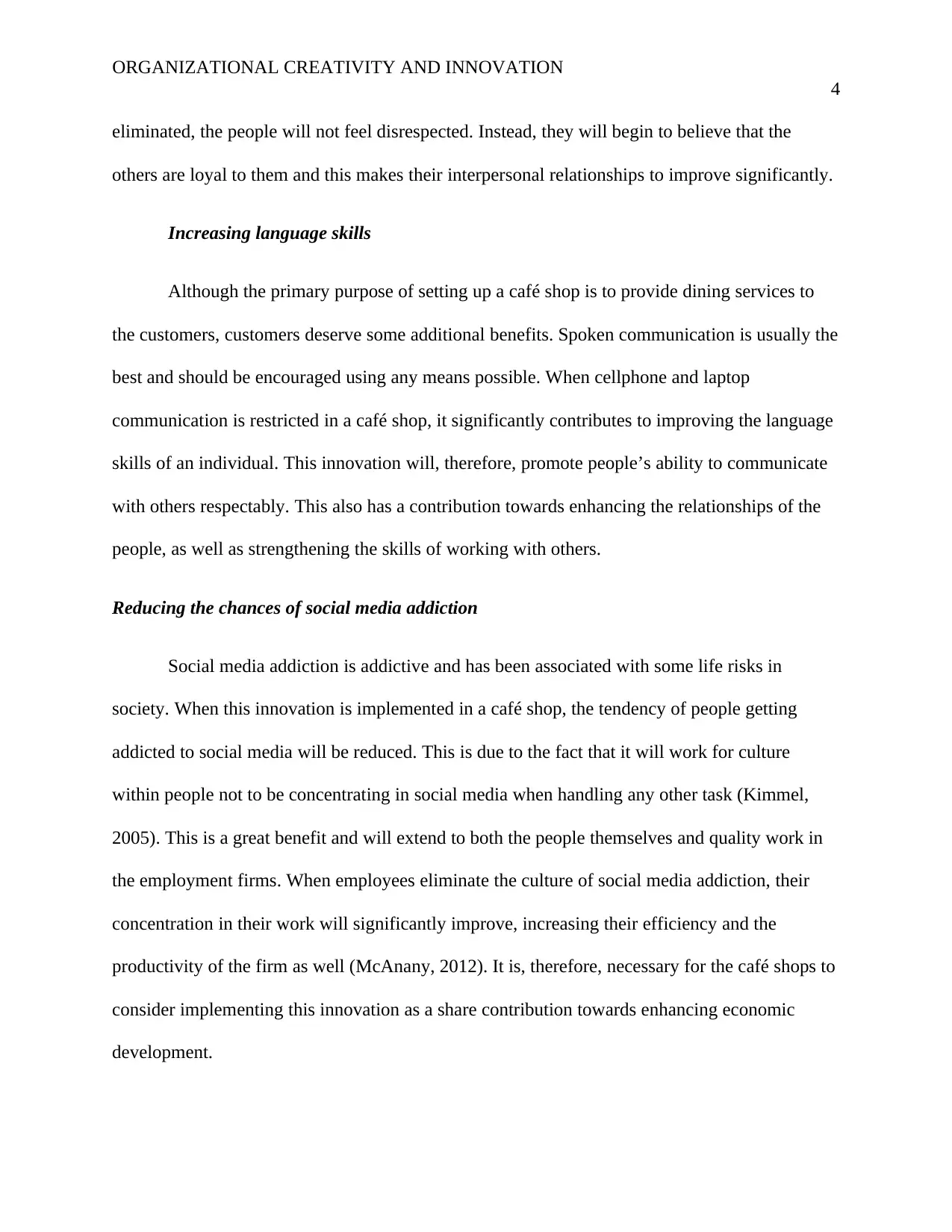
ORGANIZATIONAL CREATIVITY AND INNOVATION
4
eliminated, the people will not feel disrespected. Instead, they will begin to believe that the
others are loyal to them and this makes their interpersonal relationships to improve significantly.
Increasing language skills
Although the primary purpose of setting up a café shop is to provide dining services to
the customers, customers deserve some additional benefits. Spoken communication is usually the
best and should be encouraged using any means possible. When cellphone and laptop
communication is restricted in a café shop, it significantly contributes to improving the language
skills of an individual. This innovation will, therefore, promote people’s ability to communicate
with others respectably. This also has a contribution towards enhancing the relationships of the
people, as well as strengthening the skills of working with others.
Reducing the chances of social media addiction
Social media addiction is addictive and has been associated with some life risks in
society. When this innovation is implemented in a café shop, the tendency of people getting
addicted to social media will be reduced. This is due to the fact that it will work for culture
within people not to be concentrating in social media when handling any other task (Kimmel,
2005). This is a great benefit and will extend to both the people themselves and quality work in
the employment firms. When employees eliminate the culture of social media addiction, their
concentration in their work will significantly improve, increasing their efficiency and the
productivity of the firm as well (McAnany, 2012). It is, therefore, necessary for the café shops to
consider implementing this innovation as a share contribution towards enhancing economic
development.
4
eliminated, the people will not feel disrespected. Instead, they will begin to believe that the
others are loyal to them and this makes their interpersonal relationships to improve significantly.
Increasing language skills
Although the primary purpose of setting up a café shop is to provide dining services to
the customers, customers deserve some additional benefits. Spoken communication is usually the
best and should be encouraged using any means possible. When cellphone and laptop
communication is restricted in a café shop, it significantly contributes to improving the language
skills of an individual. This innovation will, therefore, promote people’s ability to communicate
with others respectably. This also has a contribution towards enhancing the relationships of the
people, as well as strengthening the skills of working with others.
Reducing the chances of social media addiction
Social media addiction is addictive and has been associated with some life risks in
society. When this innovation is implemented in a café shop, the tendency of people getting
addicted to social media will be reduced. This is due to the fact that it will work for culture
within people not to be concentrating in social media when handling any other task (Kimmel,
2005). This is a great benefit and will extend to both the people themselves and quality work in
the employment firms. When employees eliminate the culture of social media addiction, their
concentration in their work will significantly improve, increasing their efficiency and the
productivity of the firm as well (McAnany, 2012). It is, therefore, necessary for the café shops to
consider implementing this innovation as a share contribution towards enhancing economic
development.
Paraphrase This Document
Need a fresh take? Get an instant paraphrase of this document with our AI Paraphraser
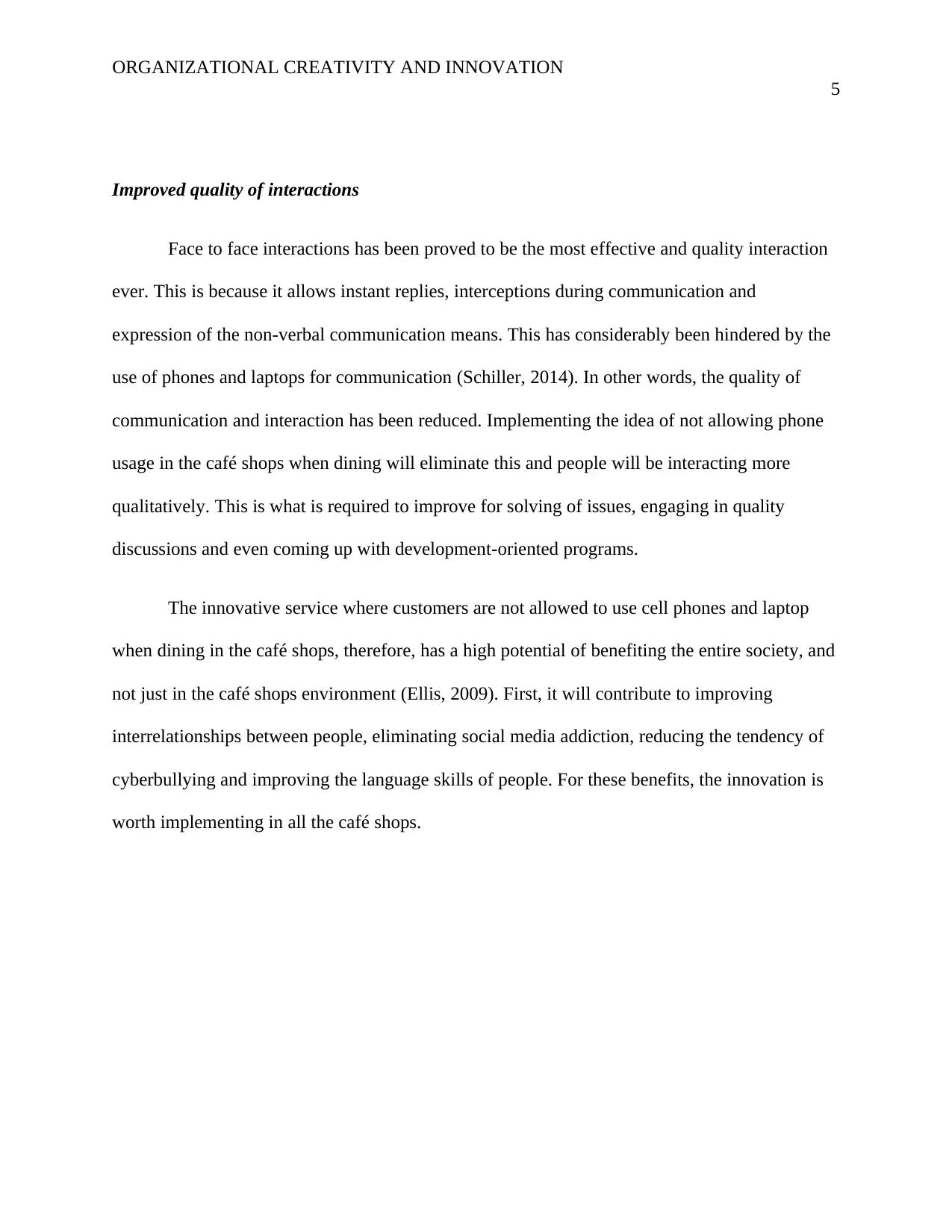
ORGANIZATIONAL CREATIVITY AND INNOVATION
5
Improved quality of interactions
Face to face interactions has been proved to be the most effective and quality interaction
ever. This is because it allows instant replies, interceptions during communication and
expression of the non-verbal communication means. This has considerably been hindered by the
use of phones and laptops for communication (Schiller, 2014). In other words, the quality of
communication and interaction has been reduced. Implementing the idea of not allowing phone
usage in the café shops when dining will eliminate this and people will be interacting more
qualitatively. This is what is required to improve for solving of issues, engaging in quality
discussions and even coming up with development-oriented programs.
The innovative service where customers are not allowed to use cell phones and laptop
when dining in the café shops, therefore, has a high potential of benefiting the entire society, and
not just in the café shops environment (Ellis, 2009). First, it will contribute to improving
interrelationships between people, eliminating social media addiction, reducing the tendency of
cyberbullying and improving the language skills of people. For these benefits, the innovation is
worth implementing in all the café shops.
5
Improved quality of interactions
Face to face interactions has been proved to be the most effective and quality interaction
ever. This is because it allows instant replies, interceptions during communication and
expression of the non-verbal communication means. This has considerably been hindered by the
use of phones and laptops for communication (Schiller, 2014). In other words, the quality of
communication and interaction has been reduced. Implementing the idea of not allowing phone
usage in the café shops when dining will eliminate this and people will be interacting more
qualitatively. This is what is required to improve for solving of issues, engaging in quality
discussions and even coming up with development-oriented programs.
The innovative service where customers are not allowed to use cell phones and laptop
when dining in the café shops, therefore, has a high potential of benefiting the entire society, and
not just in the café shops environment (Ellis, 2009). First, it will contribute to improving
interrelationships between people, eliminating social media addiction, reducing the tendency of
cyberbullying and improving the language skills of people. For these benefits, the innovation is
worth implementing in all the café shops.
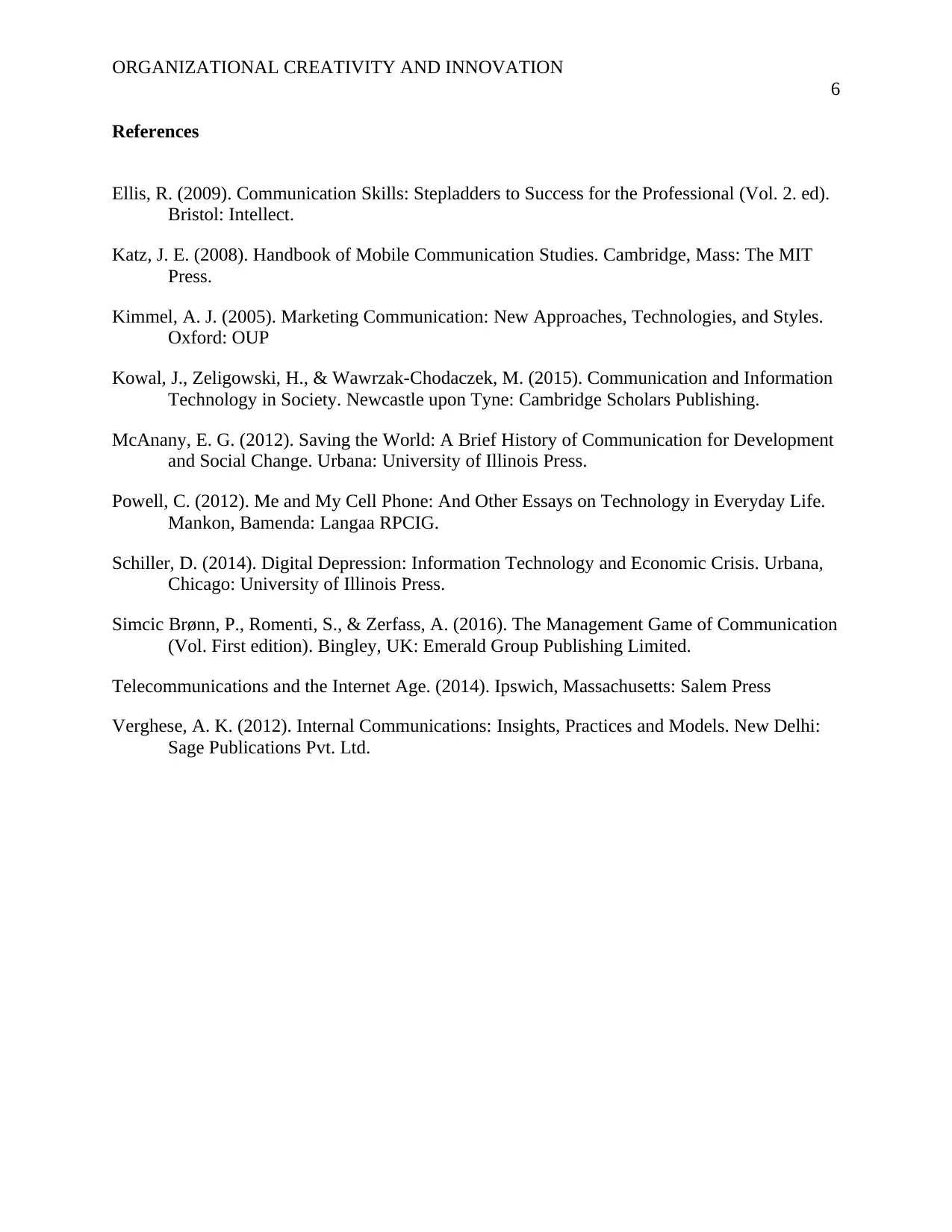
ORGANIZATIONAL CREATIVITY AND INNOVATION
6
References
Ellis, R. (2009). Communication Skills: Stepladders to Success for the Professional (Vol. 2. ed).
Bristol: Intellect.
Katz, J. E. (2008). Handbook of Mobile Communication Studies. Cambridge, Mass: The MIT
Press.
Kimmel, A. J. (2005). Marketing Communication: New Approaches, Technologies, and Styles.
Oxford: OUP
Kowal, J., Zeligowski, H., & Wawrzak-Chodaczek, M. (2015). Communication and Information
Technology in Society. Newcastle upon Tyne: Cambridge Scholars Publishing.
McAnany, E. G. (2012). Saving the World: A Brief History of Communication for Development
and Social Change. Urbana: University of Illinois Press.
Powell, C. (2012). Me and My Cell Phone: And Other Essays on Technology in Everyday Life.
Mankon, Bamenda: Langaa RPCIG.
Schiller, D. (2014). Digital Depression: Information Technology and Economic Crisis. Urbana,
Chicago: University of Illinois Press.
Simcic Brønn, P., Romenti, S., & Zerfass, A. (2016). The Management Game of Communication
(Vol. First edition). Bingley, UK: Emerald Group Publishing Limited.
Telecommunications and the Internet Age. (2014). Ipswich, Massachusetts: Salem Press
Verghese, A. K. (2012). Internal Communications: Insights, Practices and Models. New Delhi:
Sage Publications Pvt. Ltd.
6
References
Ellis, R. (2009). Communication Skills: Stepladders to Success for the Professional (Vol. 2. ed).
Bristol: Intellect.
Katz, J. E. (2008). Handbook of Mobile Communication Studies. Cambridge, Mass: The MIT
Press.
Kimmel, A. J. (2005). Marketing Communication: New Approaches, Technologies, and Styles.
Oxford: OUP
Kowal, J., Zeligowski, H., & Wawrzak-Chodaczek, M. (2015). Communication and Information
Technology in Society. Newcastle upon Tyne: Cambridge Scholars Publishing.
McAnany, E. G. (2012). Saving the World: A Brief History of Communication for Development
and Social Change. Urbana: University of Illinois Press.
Powell, C. (2012). Me and My Cell Phone: And Other Essays on Technology in Everyday Life.
Mankon, Bamenda: Langaa RPCIG.
Schiller, D. (2014). Digital Depression: Information Technology and Economic Crisis. Urbana,
Chicago: University of Illinois Press.
Simcic Brønn, P., Romenti, S., & Zerfass, A. (2016). The Management Game of Communication
(Vol. First edition). Bingley, UK: Emerald Group Publishing Limited.
Telecommunications and the Internet Age. (2014). Ipswich, Massachusetts: Salem Press
Verghese, A. K. (2012). Internal Communications: Insights, Practices and Models. New Delhi:
Sage Publications Pvt. Ltd.
⊘ This is a preview!⊘
Do you want full access?
Subscribe today to unlock all pages.

Trusted by 1+ million students worldwide

ORGANIZATIONAL CREATIVITY AND INNOVATION
7
7
1 out of 7
Your All-in-One AI-Powered Toolkit for Academic Success.
+13062052269
info@desklib.com
Available 24*7 on WhatsApp / Email
![[object Object]](/_next/static/media/star-bottom.7253800d.svg)
Unlock your academic potential
Copyright © 2020–2026 A2Z Services. All Rights Reserved. Developed and managed by ZUCOL.